Solidaridad Regional Expertise Centre (SREC) is driven by its vision and mission, through which it seeks to address the challenges posed by India’s rapidly increasing population and an equally rapid reduction of its poverty, putting pressure on its land and water resources. Today, consumers want more food, more fibre for cloth and more feed for their animals. SREC believes that this ever-growing demand can be sustained only if the agricultural sector makes a transition towards smart and sustainable land and water use, increase its production by adopting efficient processes, coupled with less pollution, greater precision in the use of fertilisers and pesticides, and a reduction in the use of water and energy.
SREC is working together with small farmers, workers, local authorities, private sector and research institutes as a catalyst for improved food production, a safer workplace, access to clean water, and a better income.
SREC Centre is a Charitable Trust established in December 2008, registered under the Indian Registration Act, 1908 and 80 G & 12 AA of The Income Tax Act, 1961. Wherein we,

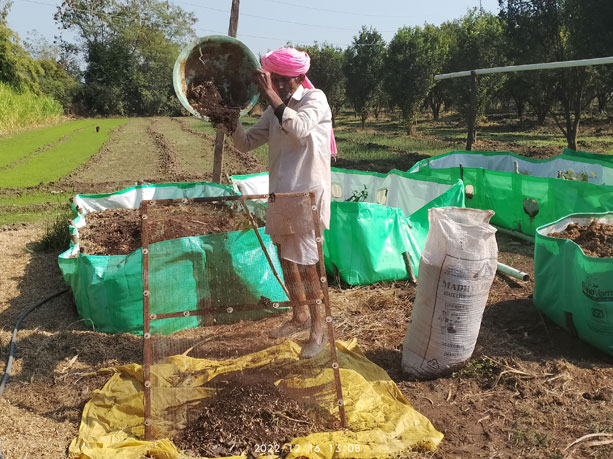
Sixty-five-year-old Kanwar Lal of Narwal village in Agar Malwa district of Madhya Pradesh had been practicing chemical intensive farming on his 8-acre land for several years read more
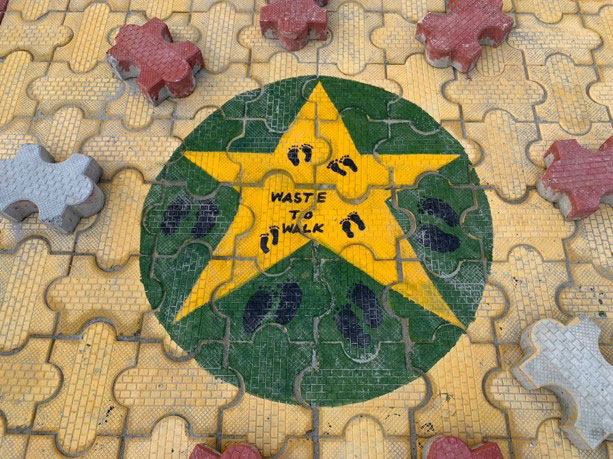
How one of the largest leather clusters in India is turning to sustainability, one block at a time, with Solidaridad Regional Expertise Centre’s ‘Waste to Walk’ read more
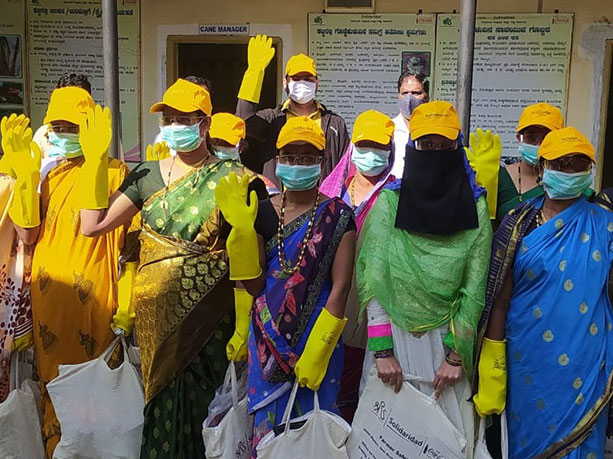
Forty-two-year-old Indira Kadam is an anganwadi worker in Munoli village in Belagavi district of Karnataka in southern India. A single woman, she read more
Issue/Volume: 35/02



During Visit of Cotton Brand Bestseller, Best Practices Highlighted
On 16 November 2025, a delegation from the brand Bestseller visited Organic Cotton Programme locations at Mangladevi, Mozar, and Pathrad Gole villages in Ner block, Yavatmal district, Maharashtra. Accompanied by a team from Solidaridad, the Bestseller team— consisting of Danique Lodewijks, Larissa Wolfmeyer, and Parbeen Singh—interacted with farmers and members of two farmer producer companies, Bemda Dam and Amla Vishweshwar.
The delegation visited demonstration plots in Mozar and Pathrad Gole villages, where a variety of practices such as the use of biological inputs, crop practices, integrated pest management, and clean cotton production have been adopted and have helped farmers in cost reduction. They also visited a weather station installed by Solidaridad at Mangladevi village and understood its benefits for farmers. Women discussed their role in agriculture and supplementary livelihoods such as running bio-input centres, mushroom cultivation etc.
Another topic of discussion was cotton premiums. A meeting was conducted at Mangladevi village in order to understand the impact of the premiums. Farmers explained that the premium is a reward to their hard work. They also expressed confidence that the support from Bestseller and Solidaridad will greatly benefit their agricultural activities.

Cross-Learning Session in Maharashtra Spotlights Integration of Weather Data in Agri Advisories
Towards the end of November, Solidaridad team discussed the “Integration of Weather Data into Advisory” at an online cross-learning session organised by Organic Cotton Accelerator. Mangesh Deulkar (Senior Programme Officer, Solidaridad Regional Expertise Centre, Nagpur) and Neelima Pahurkar (Programme Officer, Solidaridad Regional Expertise Centre, Nagpur) highlighted Solidaridad’s programmes, and how the data from Internet of Things-supported equipment is integrated into agri-advisories. The team also detailed how agri-advisories improve farming practices.
Agri-advisories disseminated to all programme farmers help them take the right decision at the right time. Moreover, the location-specific, real-time weather data details the occurrence of insects, and the economic threshold level (ETL), which makes the advisories more impactful. Advisories save farmers from the adverse effects of unseasonal rain, cost incurred on re-sowing, support irrigation management, and reduce cost of cultivation. Due to their wide-ranging benefits, more implementation partners want to integrate an agri-advisory feature in their programmes.
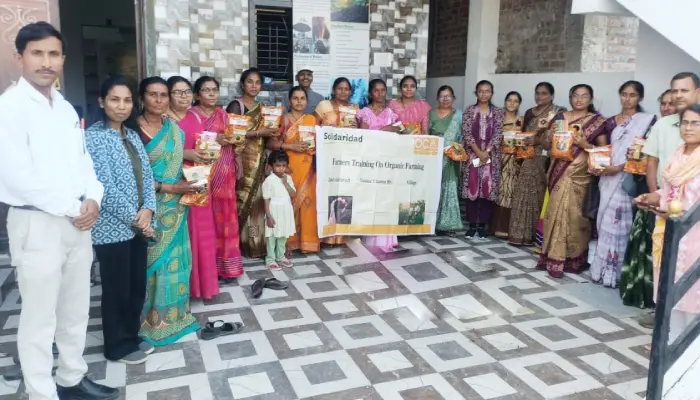
Key Principles of Gender and Decent Work Discussed at Capacity-Building Training Session
Our team in Maharashtra conducted a capacity-building training session in convergence with the Agriculture Department, on 12 November 2025, at Ner in Yavatmal district. Officials from the Block Agriculture department explained organic farming and the use of S9 culture (an organic manure culture). The highlight of the session was an interactive discussion on gender, which emphasized that gender refers not just to biological differences but also to the social roles, responsibilities, and expectations assigned to men and women. Another important component of the training was decent work, aimed at promoting knowledge on fair, safe, and dignified working conditions across agricultural value chains. Key principles of decent work include health and safety at the workplace, right to fair remuneration, decent working hours, right against exploitation, elimination of forced and child labour.
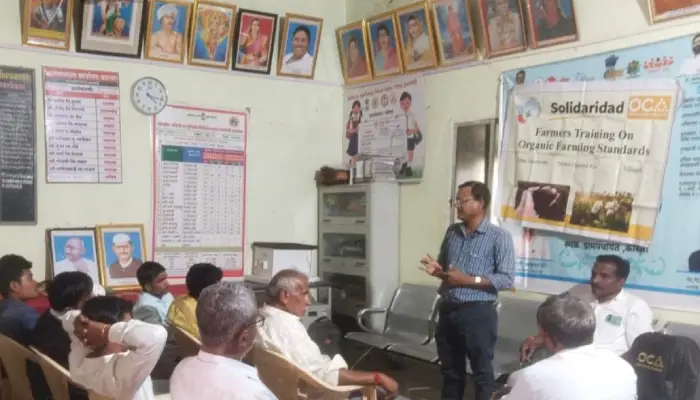
Training Sessions Equip Women with Skills to Address Pest and Insect Attacks
Solidaridad recently conducted capacity-building training for women in Mangrul Dastagir village in Amravati district. The training focused on integrated pest management in cotton, standard cotton-picking practices, as well as post-harvest and storage practices. Our experts described different diseases in cotton and the measures to control it.
Another training was conducted in November for women in Jalgaon village in Amravati district. Women farmers were trained on identification of pests and insects in cotton, measuring the ETL of pest attacks, and measures to prevent and deal with these attacks. Besides these, standard, safe cotton-picking practices were also discussed during the session, as most of the women are engaged in cotton picking, an activity prone to health hazards and risks.
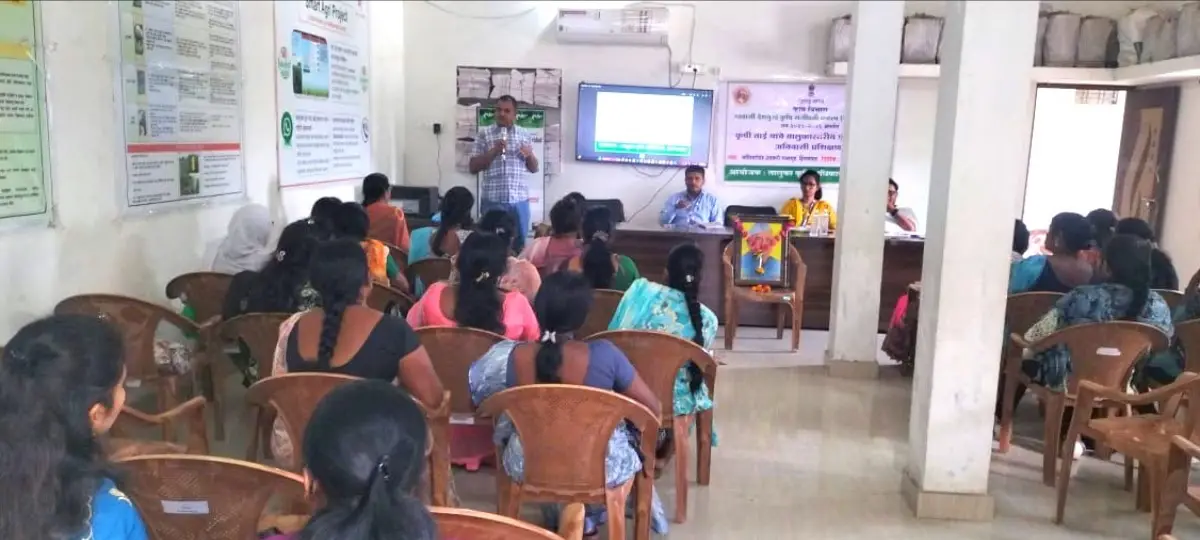
Farmers’ Training Aims to Build Climate Resilience among Smallholders
In early November, farmers’ training was conducted at the Hinganghat Resource and Training Centre in Wardha district, Maharashtra. The Block Agriculture Officer in Hinganghat and representatives from the Project on Climate Resilient Agriculture (POCRA) also participated in the event. Our staff discussed regenerative farming practices contributing to climate-resilient agriculture. In these times when the cost of cultivation has increased, these practices aim to improve soil health and yield quality in the long term.
The Block Agriculture Officer guided farmers on the government schemes and programmes such as POCRA. He stated that in the Vidarbha region, farmers should also focus on efficient water-management practices, because the scarcity of water is the major issue here. He also said that recurring pest and insect attacks can only be tackled through long-term use of bio-inputs, and adopting regenerative agriculture practices.
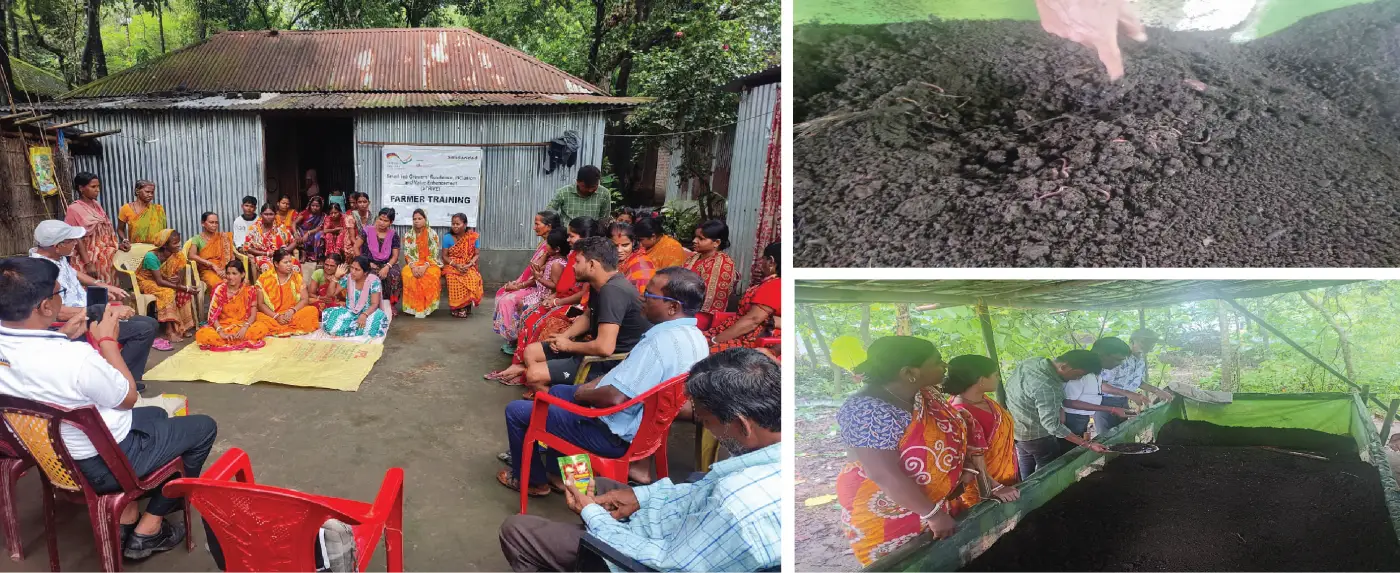
Balabari Progressive Women’s FPO in North Bengal Starts Bio-input Business,
The tea sector in India has grappled with gender inequality and marginalisation of women in the supply chain, despite women playing a key role in plantation activities. Fostering and strengthening women’s leadership is, therefore, among the cornerstones of the STRIVE programme, implemented by GIZ and Solidaridad in North Bengal, Assam and the Nilgiris in Tamil Nadu.
In North Bengal, for instance, the Balabari Progressive Women’s Farmer Producer Organisation (FPO) is taking small steps in that direction. Hailing from smallholder tea families in Chopra block of Uttar Dinajpur district in North Bengal, women in this FPO received training on making vermicompost and vermiwash, bio-inputs that are easy to prepare on the farm with cattle dung, vegetable waste and earthworms. There is a perennial demand among tea farmers in the area for these bio-inputs, which are known to aid nitrogen fixation in the soil, which in turn enhances soil fertility, leading to improved crop growth and better yields. This also reduces spend on expensive synthetic chemicals on their tea farms, ensuring safer and healthier tea. “The air is filled with toxic pesticides, but my assurance is safe chemical-free tea,” says Saiba Baidya, a member of the FPO.
With support from our team of experts, Balabari FPO is ready with their business plan and has started selling the bio-inputs to the farmers in neighbouring villages, from August 2025. Once they get this rolling, their future plan includes increasing production capacity and selling earthworms too.
Wishing them a successful enterprise!
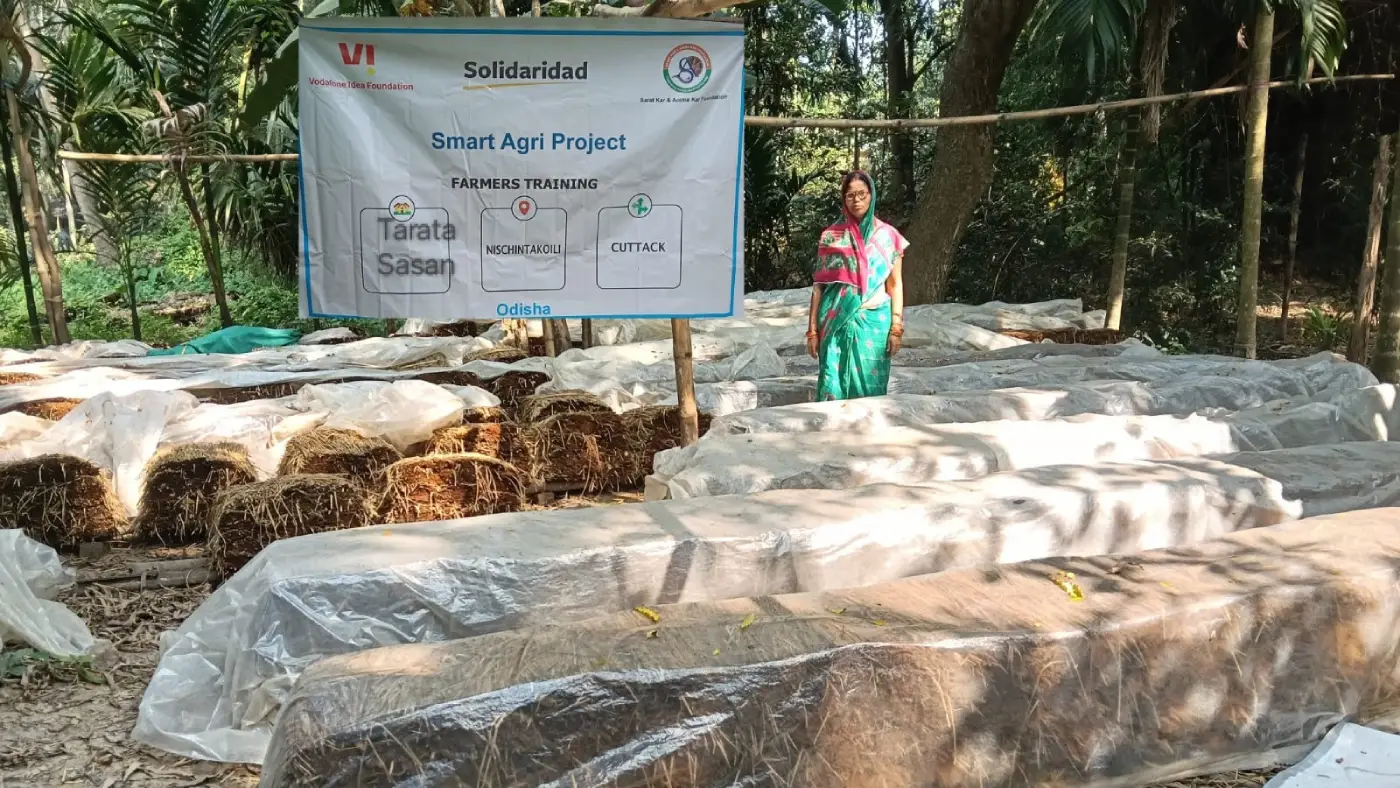
Government Support Emboldens Mushroom Farmers,
Four women farmers—Sandhyarani Samal from Jamara panchayat, Swarnalata Sathpathy from Tarata village, and Sandhyarani Sethi and Hemalata Sethi from Katikata village in Nischintakoili block, Odisha, have successfully expanded mushroom cultivation under the Smart Agri Project. With regular technical support from the project staff, they improved their skills in bed preparation, production practices, harvesting and marketing.
Earlier, the women were unaware of government support, but continuous guidance by the field staff helped them to understand the Mushroom State Plan Scheme of the Odisha Horticulture Department. Each of the farmers received a subsidy of ₹7,000 under the scheme. This financial support enabled them to establish shade-net mushroom units with a capacity of up to 150 beds. They are now able to prepare nearly 200 beds in a month, and are producing around 140 kg of paddy straw mushrooms and nearly 300 kg of oyster mushrooms. They sell paddy straw mushrooms at ₹220 per kg and oyster mushrooms at ₹100 per kg, earning an average monthly profit of ₹14,000.
This initiative has strengthened their financial stability, boosted their confidence, and encouraged many other women to take up mushroom cultivation as a sustainable livelihood option.
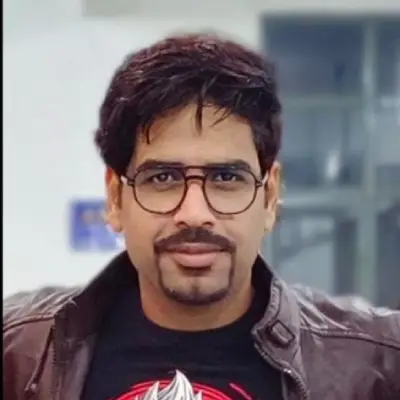
Rahul Tomar has joined as Manager-Finance and Accounts on 03 November, 2025. Rahul is a seasoned finance professional with over 15 years of experience in financial strategy, budgeting, taxation, and compliance. He holds a Master’s in Financial Analysis from ICFAI and is a Chartered Financial Analyst (CFA) as well as CA Inter qualified.
Before joining us, he served as the Deputy Head of Finance at the British High Commission, where he led budgeting, compliance, and financial operations for the India network. He has also worked with Doctors Without Borders (Médecins Sans Frontières) as Deputy Finance Coordinator, overseeing statutory compliance, tax management, payroll, and audits across multiple entities. Outside of work, he is an avid cricket enthusiast.
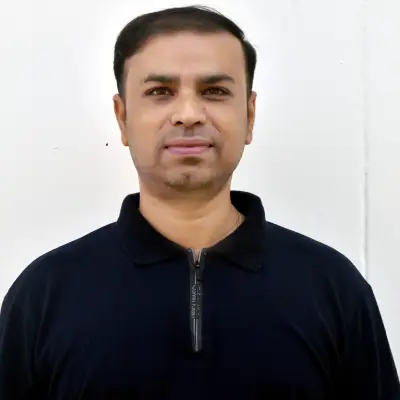
Mukul Kumar has joined as Manager-Finance and Accounts on 4 November, 2025. Mukul is an experienced finance professional with over 15 years of proven expertise in managing end-to-end financial operations. His background includes extensive experience in handling critical audits such as Statutory, FCRA, Donor (USAID, BMGF, DFID, GFATM), and Internal audits. He also has strong hands-on experience in budgeting and financial reporting for major donors, ensuring full compliance with the latest FCRA amendments and donor-specific regulations. He holds a B.Com degree from Manonmaniam Sundaranar University, Salem, and an MBA in Finance and Banking from Vinayaka Mission University. Prior to joining us, he served as Finance Manager at The George Institute for Global Health. In his free time, he enjoys reading books, solo traveling, and watching movies.